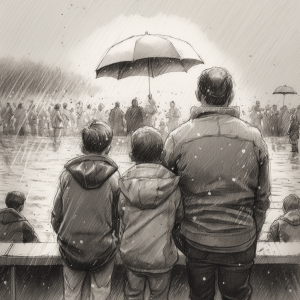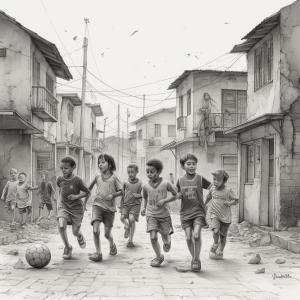Today, we are going to tackle a few questions that Anon left as comments on my previous post.
That’s right, we!
First of all I want to make this clear. This will not be a monologue, but rather a conversation or a dialogue.
That means you, my loyal readers will have the responsibility to comment and leave your opinions and/or experiences to add to the conversation.
Warning-There is no correct answers or wrong answers. The conversations will serve as a guide to allow everyone to ask the relevant questions and to challenge the current status quo.
Please remember this, it is the understanding and application of thought which counts, not the right or wrong answers. I will do my best to give you my thoughts, you may agree or you may disagree. Take what you like and leave the rest. I can live with that.
Remember to engage in the conversation. That means you have a responsibility to add to this post, to share your thoughts and experience. Ask questions and let’s debate, let’s challenge the status quo. Normally 1 out of 650 readers takes the time to comment on an individual post (average, lately its been responsive, thank you)
That simply means that the comments represent the vocal minority instead of the silent majority. Even if you agree with what’s being said, take a moment and respond. I would love to hear from you.
All right, lets begin the conversation.
First and foremost, I would like to thank Anon for his comments and questions. It means the world to me.
The comment was left in response to my post,
Soccer Career: Don’t Shoot Yourself In The Foot.
Anon posted a link to a YouTube video, which showed a 5 year old juggling a ball. If you get a chance, take a look.
Thanks for the link and I did take the time to watch the video.
“I look at this and think, my kid could do this if he would really drill it, but then, he doesn’t like to do that, he wants to play, mess around with a few moves, try to juggle a bit, then play a game and he doesn’t want to do the kind of drills it is necessary to get this skill level.”
A quick disclaimer; nothing against the boy in this video, absolute superstar.
Some quick questions Anon, has your child seen this video?
Answers, no, why not?
Yes, what did he think about the video? More importantly, how did he feel about the kid in all his YouTube glory? Was he impressed?
The comment you left on the previous post had I’d, I, my, I’d, I, I, I and you guessed it, I for a total of 8 times in a couple of short paragraphs. You need to stop asking questions that relate to you or how certain things make you feel and start finding the time to answer your child’s questions. Does he have any questions?
Ask him after you read this post and make sure to leave his answers as a comment. I would love to hear from your son; after all, this is about him.
“I look at this and think, my kid could do this….”
Absolutely agree with you 100%. He can do this if he really wants to achieve this. Your child with your love and support can achieve anything his heart desires, anything. Notice the wording Anon; I’m talking about your child. What he feels, wants and likes. I know what you want.
Before we get caught up in the glitz and glam of YouTube, the video depicts a young boy juggling a ball.
Once again, fantastic effort.
The kid is 5 years old and seems to juggle a ball like a seal. But what else do we know about this child? Is this kid preparing for the circus or to play soccer? Some of the best jugglers of the ball are not even soccer players. Have you seen some of the freestylers out there today? Are these guys’ soccer players or entertainers?
Juggling the ball does not make you a soccer player even at the age of 5.
“….then play a game and he doesn’t want to do the kind of drills it is necessary to get this skill level…”
 You talk about skill level, what skill level? The boy is very talented at juggling the ball, extremely talented, maybe the best for his age group.
You talk about skill level, what skill level? The boy is very talented at juggling the ball, extremely talented, maybe the best for his age group.
However,
Can he control the ball?
Can he trap the ball?
Can he dribble the ball?
Can he run with the ball?
Yes, juggling the ball is a skill, but it definitely doesn’t make up your skill level. When your child eventually trials with all the big clubs in Europe, they will not ask him to juggle the ball. They will not ask him for tricks or to look clever. They will look at his physique, his presence, his persona, his fitness, his intelligence, his strength, his passion and his soccer smarts.
They will also look at his touch, his speed, speed of thought and vision. They will not ask him to juggle the ball. Sigh, some of the players in the Premier League today aren’t the best jugglers in the world. But they are without a shadow of doubt some of the best players going around.
“…because he wants to play his own games, he isn’t going to achieve the skill level of this kid…”
Kids at the age of 5 should not be compared. This kid can juggle, but I bet your kid is good at something the YouTube kid struggles with.
The fact that your boy plays soccer and plays his own games is fantastic. He does what ever he wants. This attitude is great and should be harnessed. Do you want your son to be a sheep or a wolf? Great players, great leaders don’t become great because they follow instructions or follow the mob mentality. Learn to incorporate some basic skills into his play. If he is having fun, (sorry, of course he’s having fun), he will not even recognise the drills or the skills sessions.
Remember at the age of 5, fun, fun, and fun. Forget about everything else and concentrate on making it fun.
“I’d like to believe that just letting him take charge of his own development will eventually be better for him as a player. But I don’t think that.”
In the last post when I talk about taking control of your soccer career, I’m not asking a 5 year old to take charge of his soccer. Whether you’re a player, coach or parent, the lesson is the same. Anon, you as the parent should guide your child to the best of your ability without pressure, intimidation or discipline. Your child is young so pass on the wisdom, the experience of players that have travelled the path you seek for your child. Guide, protect and harness your child’s spirit. Let him enjoy the game and the rest will fall into place.
“I think the focused drills of the kid in the video would be much better for player development, but much worse for my kids fun. Am I wrong?”
Last time we talked Anon, you informed me that you never played the game and that you were not athletic. No big deal. But if you want to talk about player development you need to seek a coach (a great one of course). Ask for assistance and ask the relevant questions like you have here. Knowledge, information and wisdom are your greatest ally. Learn from past mistakes and avoid these. Remember the status quo claims up to 80% of kids playing soccer before they even become teenagers. Learn from this and change your approach. If you do what the majority of parents do, you will get the same results.
“…but much worse for my kids fun.”
At the age of 5, fun is the most important aspect. But ask your child what he considers to be fun. Ask him what he enjoys and work your way from there.
“…Am I wrong?”
Of course not. This is not about wrong or right answers, it’s about thinking and challenging the status quo. It’s about the kids at the end of the day.
“…I let him do his thing, no forcing any drills on him..”
Great stuff Anon, let him enjoy himself, he’s only 5 years old. But more importantly let him express himself. Protect, preserve and honour his enthusiasm for the game. That should be your number 1 goal at the moment.
Drills, specific training and conditioning will come with time. We must remember your child is young. What would happen if that child in the video was unhappy? You could be the best ball juggler in the world or the most skilful player in the world but it counts for doughnuts if you quit the game.
Don’t be the reason why your child quits the game. Remember success comes with time, patience and perseverance.
If you have any feedback, thoughts or questions, I’d love to hear from you. Add to the conversation.
“May the winds of destiny blow you to the stars.”



Thomas, great conversation! Some really nice, thought-provoking questions and issues that parents and coaches struggle with.
My thoughts are that there is no right answer that applies to every child. In the end, it is nothing more than a very fine line. So fine, it has no discernable edges. And it moves with time, and is not always straight. Some kids are born with unwavering motivation and desire, and most are born to have fun, yet some lack focus and aspirations of any kind. How you treat each type of child must match the type he or she is and change with the youth’s changes.
Over the years, the transition from having fun (where all kids should start and stay for many years) to competing, to excelling is hard to manage. For the really great players, it happens on its own. For some borderline kids it takes a little pushing from parents and coaches.
The worst thing we can do as the parents and coaches is to push so hard that we cause the youth player to lose interest, and react negatively to our pushing, causing him or her to leave this beautiful game without ever realizing their potential.
Recognizing who to push, when to push, how far to push, or whether to push at all, ever, is again ….. a very fine line.
Thanks Mark, great analogy with the line, so simple, yet so true. Soccer does have a transitional period and parents must be made aware of this.
A player at the age of 5 years should only be concentrating on fun. If the child is not having fun he will quit the game, simple as that. As they get older, stronger and to some extent smarter, they can be introduced to competition and other elements of the game.
Patience is a virtue don’t you think?
You need to plant the seed before you can ever enjoy the fruits of your plant. Why would kids soccer be any different? Fun, fun, fun….especially at the age of 5.
Love the post, and I really hope “Anon” or other parents do not get defensive get reading this.
From the European perspective, and having worked in an academy with a history of bringing young players through to the first team – you hit the nail on the head – we are looking for a “wolf” not a “sheep”. Players with that killer instinct, not fancy moves. This is especially true at teams from about 6th place in the PL down – they need battlers and physical specimens first and foremost to compete.
I always notice that in the traditional “circle” or “two touch” games that the players form before training, the trial and young players always have amazing touch compared to our pros. However not many at all make the grade. They must be lacking in other areas.
I assume that the majority of people reading this are Australia-based. You have a great history or sporting success and have the coaches, sport scientists, and facilities to produce ATHLETES. Why should soccer be any different (from a physical standpoint). Allow you kid to kick a soccer ball, a football, throw a shot, pass a rugby ball, spike a volleyball, jump a hurdle, grab a rebound, take a diving catch, etc. etc. THEN as your kid approaches 13/14 years old, enjoys soccer the most and shows promise, it may be time to start focusing on it.
I only really started playing the sport seriously at 19 years old – I had previously concentrated on basketball, rugby, and track & field. Now I admit I have never been the most cultured (in any sport), yet I always won everything in the air (thanks basketball), never lost my physical battles (thanks rugby), and forwards couldn’t get in behind me (thanks track & field). My example is the extreme – in all honesty I should have stuck to rugby – but I have had an amazing time playing my sports both in the UK & the US before dedicating myself to my strength and conditioning career.
My life story aside, i hope you get the idea 🙂
Answer “I don’t want to do this, I want to score goals.”
so there you have it.
Thanks, and though I am being more than a bit obsessed with my kid, hopefully enough parents will struggle with the same issues that this post isn’t just my own navel gazing.
@Howard, thanks mate, thats exactly what we’re looking for. Information, wisdom and experience are the best lessons in soccer. Don’t hold back, we’re listening.
With these conversations, I need you to talk about you and your experience. Fantastic and thank you for helping out.
Quick question, did your involvement in different sports at a young age help your strength and conditioning over time? For example, basketball and the leap, was it repetition that was the key or specific training?
@Anon, “I don’t want to do this, I want to score goals.”
Anon you’re definitely not alone. All kids want the glitz and the glam without really working for it. Not just kids for that matter, everybody wants easy street.
You need to tell your child with every practice and training drill comes development and the chance to score all the goals you want. You need to practice to become better than your opponents and to become the wolf that hunts the sheep.
Being obsessed with your child is a massive positive and a great reflection on you as a father. All fathers want the best for their children and the fact that you’re asking questions and learning speaks volumes about your character.
If all parents took a leaf out of your book, the status quo would not be at 80% now.
If all parents asked questions and challenged the status quo and didn’t pretend to know it all, well, kids soccer would be a different experience all together and senior soccer would be flooded with young, raw talent.
No worries Thomas – I like your approach to what you are trying to cover with this website and enjoy reading your posts. My passion is with younger athletes anyways so it fits!
To answer your question I feel it was a little of both. In my mid-teens I would say that it was the specific training that contributed to improve those athletic qualities transfer to soccer. However the biggest impact I feel comes from earlier years playing every kind of game under the sun.
Yes repetition – not practice as such but exposing the young body to a range of differing demands over the course of time leads to a solid base of movement skills that the kid can call upon later in life when specialization occurs.
@Howard, thats interesting, I had assumed that players had to mostly specialize by 9 or 10 to be really good. I thought that was how the European systems worked. American kids like Australians tend to want to play multiple sports (mine loves baseball and basketball too), so it would be nice if that was a viable path to success.
I was wondering about the fancy moves things as well, watching Wayne Rooney, who I love as a player, it doesn’t seem like he does much in the way of fancy moves, he just manages to be in the right place.
@Anon, see the bigger picture. Don’t get blinded by fancy moves and tricks. Wayne Rooney, Michael Owen, Alan Shearer, Van Basten, Stoickhov, were amazing players and lethal strikers. Did you ever see them juggle the ball? They had strength, pace to burn and could be at the right spot at the right time.
What about Vinnie Jones, Tony Adams, Pallister, Gascgoine? Did they have fancy foot work? They were players that would kick the friggin shit out of you every chance they got. They played to their strengths and used their physical strength for intimidation.
What about Maldini, Baressi, Ned Zelic, Nesta, Carvahlleo? They use their vision and the ability to read the game. These defenders have the ability to read the play and intercept the play before it actually unfolds. Juggling? Not so much.
Keep the little man in soccer and sports for as long as possible. As he develops and grows, he will find his strengths and his niche.
Anon
“To be really good” – I certainly was never “really good” – I just used me as an extreme example, but I certainly exceeded the expectations of my coaches once I did finally specialize and earn’t a little bit of money doing it.
Don’t get me wrong, early specialization is very common in the majority of European models, however this is usually due to the choices of the parents and not the clubs.
As strength and conditioning coach for our academy at my last club, I encouraged the younger players to participate in other sport. They trained/played 2 or 3 times per week with us, but when away from us I said it would be better for them to play sports other than soccer at school and for fun with friends, rather than focusing purely on soccer. I know many other professionals in similar positions gave similar recommendations. Obviously, many parents didn’t take the advice and got their kids to do hours and hours with individual coaches, etc. but in the long run, the players with a broad range of movement skills will succeed.
I feel there is too much info on this to cover as a comment.
I can write a whole blog post on it if you like Thomas?
@Howard, fantastic advice and feedback.
At a very young age, the more exposure to physical activity the better. Activities don’t need to be competitive, but need to place some resistance on the developing body.
As the body grows and develops, you can then concentrate on specialization depending on the kind of player you want to become.
If you throw in fun, learning and good times with your activities or training, you have a future athlete on your hands irrespective of the sport he/she chooses.
@Howard, “I can write a whole blog post on it if you like?”
That would be fantastic and my readers would love to hear from you.
Can I contact you via email Howard? I’ve got an idea I think you might be interested in and would love to hear your thoughts. Eagerly waiting, Thomas.